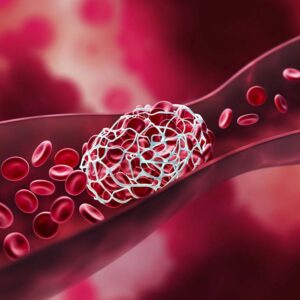
Vitamin Linked to Dementia, Schizophrenia and Autism
- Discover why blood tests may not always tell you what’s going on in your brain
- New research finds this common nutrient to be vital for brain health throughout the course of life. Find out more…
- Plus, the best ways to boost your levels!
Dear Living Well Daily,
Recently, new research has found that the brains of folks with dementia, schizophrenia and autism have a common link.
And it’s not a rare genetic marker or complex brain structure discovered by a fancy scan (well, not in the research we are talking about here, anyway)…
No, this connection is pretty straightforward — it’s a vitamin B-12 deficiency. And it was discovered in a groundbreaking new study that revealed some astonishing truths about the way B-12 works in our bodies, particularly our brains.
You see, this study found that blood levels of B-12 don’t always match brain levels of B-12. This, coupled with the fact that brain levels of B-12 decline with age, could be the cause of these neurological disorders.
![]() Brainy Research
Brainy Research
The first-of-its-kind study done at Nova Southeastern University was published in the journal PLOS ONE and it compares the levels of vitamin B-12 in human brains across a life span.
The findings suggest that poor uptake of vitamin B-12 from the blood to the brain could be related to certain neurological diseases like dementia, schizophrenia and autism.
The study, led by professor of pharmacology Richard Deth, Ph.D., examined the brains of over 60 deceased people with ages ranging from fetus to 80 years. Of these 60, nine had autism and 12 had schizophrenia.
The researchers found that vitamin B-12 levels were 10 times lower in the brains of the oldest subjects compared with those of the youngest. This reflects the natural and gradual decline that occurs with aging, which can also play a role in the onset of dementia.
Next, they found that the B-12 levels in the brains of both adults with schizophrenia and children with autism were about one-third of those found in people of the same age who did not have these neurological conditions. The schizophrenics were ages 36–49, yet their B-12 levels reflected those of a 72-year-old brain. The autistic children were all under the age of 10, but their B-12 levels reflected those of someone in their fifties.
According to Deth, low levels of B-12 may be detrimental because it can hinder the brain’s ability to create significant neural connections. This means, without a healthy level of B-12, your brain activity may malfunction.
![]() Live Well With B-12
Live Well With B-12
While this study doesn’t prove that B-12 deficiency is a direct cause of autism, schizophrenia or dementia, it certainly opens the door for more research on this link. These findings also support scientists who believe the human brain uses vitamin B-12 to control gene expression and spur neurological development throughout the course of human life — from fetus through old age.
In addition, both autism and schizophrenia are associated with oxidative stress, which is also linked to aging. The researchers think oxidative stress could play a role in the decreased B-12 levels in the brain.
As of now, there isn’t a way to test your brain levels of B-12. That’s why it’s important to regularly eat foods with high levels of B-12. These include red meats, cheeses and eggs.
If you’re unsure if your diet is supplying you with the right amount of B-12, supplementation is another way to ensure your intake.
Just be sure to purchase supplements that contain the methylcobalamin form of B-12. It’s the most active in the body and is the same type of B-12 measured in the study. Plus, it’s best to get the sublingual tablets verses capsules. This means the B-12 is absorbed directly in the mouth and doesn’t depend on the stomach for digestion.
Live well,

Natalie Moore
Managing editor, Living Well Daily
Sources
[1] Decreased Brain Levels of Vitamin B12 in Aging, Autism and Schizophrenia
[2] Low B12 may be linked to autism, dementia, schizophrenia
[3] Neuropsychology of vitamin B12 deficiency in elderly dementia patients and control subjects.
[4] Vitamin B12, Vitamins, Autism, Schizophrenia
[5] Glutathione: The Mother of All Antioxidants
Written By Natalie Moore
Natalie Moore is a dedicated health researcher with a passion for finding healthy, natural, and science-based solutions. After a decade of direct healthcare experience in western and natural medicine, she was involved in public health research before joining Living Well Daily.
View More Free Articles
Mailbag: Diarrhea Remedies That Really Work
“I have had diarrhea for 6 months. I’m going crazy and don’t know how to stop it! Please help!” – Can’t Stop Running Dear Can’t Stop, Few things disrupt life like battling a bout of diarrhea. Diarrhea is typically defined as having three or more loose, watery stools daily. If you experience this for over...
Take the SHORTER Path to Dramatically Better Health
Are you tired of fitness gurus preaching the virtues of 5 AM workouts and pushing Olympic-level training regimens? Their narrative can feel exhausting and entirely unattainable. But before you toss in the towel completely, I’ve got news that might just put a spring back into your step. A groundbreaking new study reveals that the key...
Unexpected Perks of Your Coffee Habit Revealed!
We all know that the first cup of coffee in the morning can FEEL like a lifesaver. But what if it might actually BE saving your life? A groundbreaking new study suggests that your daily coffee habit could be protecting you from not just one but multiple chronic diseases. Let’s pour over this fascinating research…...
The TRUTH About Diabetes Drugs and Brain Aging
You’ve probably seen the gushing headlines… Most say something like, “Common diabetes drug protects the brain against aging!” And let’s face it, that sounds fantastic. After all, who doesn’t want to keep their brain young and in tip-top shape? The headlines refer to the results of a new study that suggests the widely prescribed type...
Hidden Smartphone Danger Puts You at Risk
Remember when we thought cell phones were just something for young folks to obsess over? Back when we were convinced they were nothing more than a passing fad? Well, times certainly have changed. Now, most people… including many of us older folks… have jumped on the smartphone bandwagon. Heck, some of us are practically as...
Preserve Your Mobility with “Agile Aging” Exercises
Aging has a way of humbling us. You lose hair where you want to keep it—and often end up growing it where you don’t. With every passing year, your eyesight fades, and your waistline expands. And as your once quick pace begins to slow, you fear developing the dreaded “senior shuffle.” But here’s the thing....
Yes, Lazy Saturday Lie-Ins Can BOOST Your Health
Are you burning the midnight oil during the week and catching up on sleep on weekends? Well, I’ve got some news that might help you feel less guilty about those lazy Saturday mornings. A new study suggests that weekend lie-ins might be doing far more than just helping you feel refreshed. Experts say they could...
Mailbag: 7 Hidden Culprits Behind Your Weight Gain
“Why am I gaining weight, even though I am watching what I am eating?” – Battling the Bulge Dear Battling, Gaining weight when you’re not trying to is frustrating. And it just gets worse as we age… often regardless of our diet. The truth is that various factors can promote weight gain even when you’re...
Popular Artificial Sweetener Linked to Dangerous Heart Risk
Remember when erythritol was the darling of the health food world? Well, this popular sugar substitute might not be as sweet a deal as we were led to believe… A shocking new study reveals a dark side to this widely used artificial sweetener. It turns out erythritol is associated with a dangerous—and even deadly—heart risk....
Cracking the Code on Chronic Inflammation
Inflammation and obesity are the evil tag team at the heart of nearly every major disease we face—from diabetes to obesity. What starts as a normal, healthy process to fend off dangerous invaders can quickly fan into the flames of chronic inflammation… and that includes in your gut. The trouble is almost no one has...









